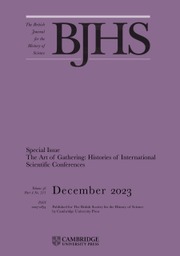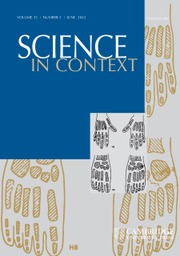Refine search
Actions for selected content:
13581 results in History of science and technology
Tobias Mayer (1723–62): A Case of Forgotten Genius
-
- Journal:
- The British Journal for the History of Science / Volume 5 / Issue 1 / June 1970
- Published online by Cambridge University Press:
- 05 January 2009, pp. 1-20
- Print publication:
- June 1970
-
- Article
- Export citation
Sixteenth and Seventeenth Centuries - A Portrait of Isaac Newton. By Frank E. Manuel. Harvard University Press and Oxford University Press. Pp. xvi + 478. 1968. 114s.
-
- Journal:
- The British Journal for the History of Science / Volume 5 / Issue 1 / June 1970
- Published online by Cambridge University Press:
- 05 January 2009, pp. 100-101
- Print publication:
- June 1970
-
- Article
- Export citation
Twentieth Century - Scientific Thought, 1900–1960: A Selective Survey. Ed. by R. Harré. London: Clarendon Press: Oxford University Press. 1969. Pp. vii + 277. 44 figs. and 8 plates. 65s.
-
- Journal:
- The British Journal for the History of Science / Volume 5 / Issue 1 / June 1970
- Published online by Cambridge University Press:
- 05 January 2009, pp. 105-106
- Print publication:
- June 1970
-
- Article
- Export citation
Sixteenth and Seventeenth Centuries - John Locke: Problems and Perspectives. Ed. by John W. Yolton. London: Cambridge University Press. 1969. Pp. vii + 278. 55s.
-
- Journal:
- The British Journal for the History of Science / Volume 5 / Issue 1 / June 1970
- Published online by Cambridge University Press:
- 05 January 2009, pp. 101-102
- Print publication:
- June 1970
-
- Article
- Export citation
Astronomy and Navigation - The High Firmament: A Survey of Astronomy in English Literature. By A. J. Meadows. Leicester: Leicester University Press. 1969. Pp. x + 207. 4 figs. 42s.
-
- Journal:
- The British Journal for the History of Science / Volume 5 / Issue 1 / June 1970
- Published online by Cambridge University Press:
- 05 January 2009, p. 92
- Print publication:
- June 1970
-
- Article
- Export citation

The British Journal for the History of Science
- Published for: The British Society for the History of Science Title history: Bulletin of the British Society for the History of Science (1949 - 1961), The British Journal for the History of Science (1962 onwards)
-
- Journal
-
- Get access
- Contains open access

Science in Context
-
- Journal
-
- You have access: full
- Open access
-
Science in History
- Series
BJH volume 4 issue 4 Cover and Back matter
-
- Journal:
- The British Journal for the History of Science / Volume 4 / Issue 4 / December 1969
- Published online by Cambridge University Press:
- 05 January 2009, pp. b1-b4
- Print publication:
- December 1969
-
- Article
-
- You have access
- Export citation
William Whewell and the History and Philosophy of Science
-
- Journal:
- The British Journal for the History of Science / Volume 4 / Issue 4 / December 1969
- Published online by Cambridge University Press:
- 05 January 2009, pp. 399-400
- Print publication:
- December 1969
-
- Article
- Export citation
Astronomy and Physics - Bau und Bildung des Weltalls. By Bernhard Sticker. Freiburg: Verlag Herder. Pp. 272. 10 illus. 1967. Price not stated.
-
- Journal:
- The British Journal for the History of Science / Volume 4 / Issue 4 / December 1969
- Published online by Cambridge University Press:
- 05 January 2009, pp. 407-408
- Print publication:
- December 1969
-
- Article
- Export citation
Notes on Contributors
-
- Journal:
- The British Journal for the History of Science / Volume 4 / Issue 4 / December 1969
- Published online by Cambridge University Press:
- 05 January 2009, p. 423
- Print publication:
- December 1969
-
- Article
- Export citation
Chemistry - Joachim Jungius' Experimente und Gedanken zur Begründung der Chemie als Wissenschaft. Ein Beitrag zur Geistesgeschichte des siebzehnten Jahrhunderts. By Hans Kangro. (Boethius. Texte und Abhandlungen zur Geschichte der exakten Wissenschaften, vol. VII.) Wiesbaden: Franz Steiner. Pp. xxv + 479. Plates. 1968. DM. 90.
-
- Journal:
- The British Journal for the History of Science / Volume 4 / Issue 4 / December 1969
- Published online by Cambridge University Press:
- 05 January 2009, pp. 409-411
- Print publication:
- December 1969
-
- Article
- Export citation
Astronomy and Physics - The Celestial Worlds Discover'd. By Christian Huygens. London: F. Cass.1968. Pp. (vi) + vi + 160, with 5 figs. 45s.
-
- Journal:
- The British Journal for the History of Science / Volume 4 / Issue 4 / December 1969
- Published online by Cambridge University Press:
- 05 January 2009, pp. 406-407
- Print publication:
- December 1969
-
- Article
- Export citation
Biology and Medicine - The Human Brain and Spinal Cord. A Historical Study Illustrated by Writings from Antiquity to the Twentieth Century. By Edwin Clark and C. D. O'Malley. Berkeley and Los Angeles: University of California Press. 1968. Pp. xiii + 926. $25.00.
-
- Journal:
- The British Journal for the History of Science / Volume 4 / Issue 4 / December 1969
- Published online by Cambridge University Press:
- 05 January 2009, pp. 413-414
- Print publication:
- December 1969
-
- Article
- Export citation
Astronomy and Physics - The Electrical Researches of the Honourable Henry Cavendish. Ed. by James Clerk Maxwell. Reprint of 1879 edition. London: Frank Cass & Co. Pp. lxvi + 454. 1967. £6 6s.
-
- Journal:
- The British Journal for the History of Science / Volume 4 / Issue 4 / December 1969
- Published online by Cambridge University Press:
- 05 January 2009, pp. 408-409
- Print publication:
- December 1969
-
- Article
- Export citation
Chemistry - Dissertation on Elective Attractions. By Torbern Bergman, translated with an introduction by J. A. Schufle. New York and London: Johnson Reprint Corporation. 1968. Pp. xxvii + 112. Plates. $12.50.
-
- Journal:
- The British Journal for the History of Science / Volume 4 / Issue 4 / December 1969
- Published online by Cambridge University Press:
- 05 January 2009, pp. 411-412
- Print publication:
- December 1969
-
- Article
- Export citation
Eighteenth and Nineteenth Centuries - An Index to the Correspondence and Papers of James David Forbes (1809–1868) and also to Some Papers of his Son, George Forbes. St. Andrews University Library. 1968. Pp. ix + 123. 40s.
-
- Journal:
- The British Journal for the History of Science / Volume 4 / Issue 4 / December 1969
- Published online by Cambridge University Press:
- 05 January 2009, pp. 422-423
- Print publication:
- December 1969
-
- Article
- Export citation
Seventeenth Century - The Lives of the Professors of Gresham College. By John Ward. (Facsimile of the 1740 London edition.) New York and London: Johnson Reprint Corporation. 1967. Pp. xxiv + 338 + 156. Plates. $20.00.
-
- Journal:
- The British Journal for the History of Science / Volume 4 / Issue 4 / December 1969
- Published online by Cambridge University Press:
- 05 January 2009, pp. 419-420
- Print publication:
- December 1969
-
- Article
- Export citation
